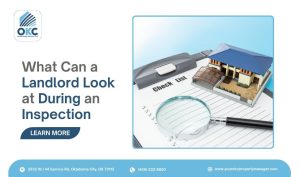If you’re a property owner or real estate investor in Oklahoma City, you’ve likely heard the term “duplex” tossed around. But what exactly is a duplex—and more importantly, why should it matter to you?
Simply put, a duplex is a residential building divided into two separate units, each with its own entrance, kitchen, bathroom, and living space. Duplexes strike a unique balance between single-family living and multifamily investment potential.
At OKC Home Realty Services, we’ve spent over 15 years helping property owners and investors manage duplexes across Oklahoma City and surrounding metro areas like Edmond, Moore, and Yukon. From firsthand experience, we’ve seen how duplexes can deliver steady income, flexible living arrangements, and long-term appreciation when managed right.
In this article, we’ll break down everything you need to know about duplexes: how they’re structured, their pros and cons, how they differ from similar property types, and why they might be the right fit for your next real estate move.
Maximize Your Rental Income with Hassle-Free Property Management
Request a Service →What Exactly Is a Duplex?
A duplex is a single building divided into two separate living units. These units can be stacked (one upstairs, one downstairs like apartments) or placed side-by-side (like townhomes), sharing a common wall. ‘Think of it as a hybrid between a single-family home and a multi-family investment,’ says Brandon Turner, real estate investor and author of The Book on Rental Property Investing. ‘It gives you the flexibility of living in one unit while renting the other to offset your mortgage.’
Simply take it as a “two-for-one” property: one asset, two rent checks.
Pros and Cons of Owning a Duplex
Duplexes are a popular “starter” investment for landlords, but they’re not without trade-offs. Let’s break down the advantages and challenges in plain terms so you can decide if a duplex fits your goals.
Advantages of Owning a Duplex
Here are the key benefits for landlords loving duplexes:
1. Dual Income Streams, Lower Risk
- Two tenants = two rent checks. If one unit is vacant, the other still covers part of your mortgage payments.
- Example: A $300k duplex with a $2,000/month mortgage can generate $3,000/month in rent ($1,500/unit). Even if one unit is empty, you’re only $500 short—not $2,000.
- Stats: Duplex vacancy rates are 5-6% (vs. 7-8% for single-family rentals), per the U.S. Census Bureau.
2. Live Rent-Free via “House Hacking”
- Occupy one unit, rent the other. Your tenant’s rent can offset your entire housing cost.
- Example: If your mortgage is $2,000/month and you charge $1,500 for the rented unit, you’ll only pay $500/month to live there or even profit if rents are higher.
3. Better Financing Options
- FHA loans: Only 3.5% down if you live in one unit (vs. 20-25% for traditional investment properties).
- Conventional loans: Lower interest rates for 2-4 unit properties compared to commercial loans.
4. Tax Benefits
- Deduct mortgage interest, property taxes, insurance, repairs, and depreciation (a non-cash expense that lowers taxable income).
- If you live in one unit, you can deduct expenses only for the rented half (e.g., 50% of roof repairs).
5. Appreciation + Equity Building
- Duplexes appreciate like single-family homes but build equity faster thanks to rental income. From 2020-2023, duplex values rose 25% nationally (Zillow).
- Duplexes are a solid real estate investment due to their appreciation and rental income potential.
- Use cash flow to pay down the mortgage faster or fund future investments.
6. Easier Management Than Larger Properties
- Two tenants are simpler to manage than 4+ as in a 4-plex.
- Great for DIY landlords who want to avoid hiring a property manager.
Disadvantages of Owning a Duplex
1. Higher Upfront Costs Than Single-Family Homes
- Duplexes cost 20-30% more than comparable single-family homes in the same area.
- The average duplex typically measures around 900 square feet and can appear in different configurations, such as side-by-side or stacked layouts. It is often more affordable compared to single-family homes, making it a popular choice in urban areas and college towns.
- Example: A 3-bed single-family home might cost $250k, while a duplex with two 2-bed units could cost $350k.
2. Tenant Proximity = Potential Conflicts
- Shared walls mean noise complaints, parking disputes, or personality clashes between tenants due to close proximity.
- Mitigation: Screen tenants rigorously and include clear noise/parking rules in leases.
3. Maintenance Responsibilities
- You’re responsible for shared systems (roof, plumbing, HVAC). A leak in one unit can affect both.
- Budget 1-2% of the property’s value annually for repairs (e.g., $3,500-$7,000/year for a $350k duplex).
4. Zoning and Legal Hurdles
- Some cities restrict short-term rentals (Airbnb) or require special permits for multi-family properties.
- Always check local laws before buying, especially in HOA-governed neighborhoods.
5. Lower Rent per Unit Than Single-Family Homes
- Duplex units often rent for 10-15% less than standalone homes in the same area.
- Why? Tenants may pay a premium for more privacy.
6. Resale Challenges
- Duplexes appeal to a smaller buyer pool (mostly investors vs. families).
- In a slow market, they can take longer to sell than single-family homes.
7. Time Commitment
- Handling repairs, tenant turnover, and rent collection for two units can feel like a part-time job.
- Solution: Hire a property manager (costs 8-12% of rent), but this cuts into profits.
Maximize Your Rental Income with Hassle-Free Property Management
Request a Service →Duplex vs. Single-Family Homes vs. Larger Multifamily
Here’s how duplexes compare to other popular rental types in OKC:
Duplex vs. Single-Family Homes
When comparing duplexes and single-family homes, duplexes offer greater rental income potential since they have two separate units—allowing you to rent out both or live in one while leasing the other. This setup can significantly reduce your housing costs and increase your cash flow. However, it also means more maintenance and tenant coordination, as you’re managing two households instead of one. In contrast, single-family homes are simpler to manage, usually come with lower upkeep costs, and are easier to resell due to their broader appeal to families and traditional buyers. In Oklahoma City, duplexes perform well in areas with strong rental demand like Capitol Hill or Edmond, while single-family homes shine in suburban neighborhoods with long-term tenants.
Duplex vs. Larger Multifamily (Triplex, Fourplex, Apartments, etc.)
Compared to larger multifamily properties, duplexes offer a simpler, more manageable entry point into real estate investing. They typically cost less to purchase, are easier to finance (especially with owner-occupied loans like FHA), and involve fewer tenants to manage. This makes them ideal for first-time investors or those wanting to “house hack.” Larger multifamily buildings—like triplexes, fourplexes, or small apartment complexes—can generate more rental income, but they come with higher upfront costs, more complex maintenance, and often require commercial financing. In Oklahoma City, duplexes are common in residential neighborhoods, while larger multifamily units are more concentrated near downtown or college areas where tenant turnover is higher but demand is strong.
For new investors, duplexes strike a balance: manageable scale with outsized returns.
Related Read: Best Rental Property Loan Types
Comparison:
| Feature | Single-Family | Duplex | Larger Multifamily |
| Units | 1 | 2 | 3+ |
| Owner can live in one unit | No | Yes | Yes |
| Rental income potential | Low | Medium | High |
| Management complexity | Low | Medium | High |
| Financing difficulty | Easy | Moderate | Harder (5+ units) |
| Privacy | High | Medium | Low |
A duplex gives you a middle-ground option, more rental income than a single-family home, but less complexity than larger multifamily buildings.
3 Challenges to Watch Out For
Here are 3 key challenges to watch out for when owning or investing in a duplex
1. Tenant Management
Two units mean twice the tenants, leases, and potential for conflict. Managing communication, late rent, or maintenance requests can get overwhelming.
Tip: Use property management software like TurboTenant or Buildium to streamline applications, lease signing, and communication.
2. Maintenance Costs
Duplexes often share systems like the roof, plumbing, or HVAC, so when something breaks, it can affect both units. Costs can add up quickly.
Tip: Budget 1–2% of the property’s total value annually for maintenance. Regular inspections help catch issues early.
3. Zoning Laws and Local Regulations
Every city has different zoning rules, especially for rentals, short-term stays (like Airbnb), parking, and property modifications.
Tip: Always check with your local building or zoning department before making changes or listing your units for rent—some areas have strict restrictions.
How to Finance a Duplex
Buying a duplex gives you the chance to live in one unit and rent out the other, helping cover your mortgage. Here are three common financing options:
1. FHA Loan (Federal Housing Administration)
How It Works:
An FHA loan is a government-backed mortgage designed to help people buy a home with a low down payment.
- You only need 3.5% down.
- Credit score requirement is usually lower (580+).
- You must live in one unit as your primary residence for at least 1 year.
- You can use rental income from the other unit to help qualify.
For Example:
- Purchase Price: $400,000
- Down Payment (3.5%): $14,000
- Live in one unit, rent the other out.
Bonus: Great for first-time buyers who want to start investing while living affordably.
2. Conventional Loan
How It Works:
This is a traditional mortgage (not government-backed) used for both owner-occupied and investment properties.
- For non-owner-occupied duplexes, the down payment is typically 15%–25%.
- If you plan to live in one unit, you may qualify for lower down payment options (as low as 5–10%).
- You’ll usually need stronger credit and proof of stable income.
For Example:
- Purchase Price: $400,000
- Down Payment (20%): $80,000
- Better for investors who don’t plan to live in the property.
Tip: If you’re not living there, expect higher interest rates and more lender scrutiny.
3. House Hacking
What It Is:
House hacking means living in a part of the property while renting out the rest, often with the goal of covering your mortgage or even earning a profit.
- It works perfectly with a duplex.
- Rental income from the second unit can help you qualify for a larger mortgage.
- Can be used with FHA or conventional loans.
For Example (Using FHA Loan):
- Duplex Price: $400,000
- Down Payment (3.5%): $14,000
- Monthly Rent from 2nd unit: $1,500
- Monthly mortgage + expenses: $1,000
- Cash flow: $500/month profit
Why It’s Popular: It’s a smart way to start real estate investing with little money down and build equity while living rent-free (or close to it).
Comparison:
| Financing Option | Down Payment | Owner Occupancy Required | Rental Income Can Help Qualify? | Notes |
| FHA Loan | 3.5% | Yes | Yes | Great for first-timers |
| Conventional Loan | 15–25% (or as low as 5% if owner-occupied) | No (optional) | Yes (if documented) | Good for experienced investors |
| House Hacking | Hacking Varies (depends on loan type) | Yes | Yes | Strategy, not a loan itself |
Is a Duplex Right for You?
If you want to start small but earn big, reduce financial risk with dual income streams, and build wealth through equity and tax breaks, a duplex could be the perfect fit. It’s an ideal investment for new landlords looking to break into real estate or seasoned investors who want steady cash flow without the complexity of large-scale properties. Just make sure you’re ready for the responsibilities of tenant management and property upkeep.
If you’re thinking about investing in or living in a duplex, it’s important to understand how they differ from other rental options in Oklahoma City. While duplexes offer privacy and rental income potential, some tenants may prefer single-family homes with more space and yard access, like these houses for rent in OKC available through our listings.
Maximize Your Rental Income with Hassle-Free Property Management
Request a Service →FAQs on Duplex House
Is a duplex considered a single-family home?
No. A duplex is a multifamily property with two separate living units. Unlike a single-family home (one unit), a duplex has two units under one roof, each with its own entrance and utilities.
What does it mean to live in a duplex?
Living in a duplex means you occupy one of two separate units within the same building. You’ll have your own private entrance, kitchen, and living space, but you’ll also share walls and possibly a yard or driveway with your neighbor. It’s a great way to reduce housing costs, especially if you own the property and rent out the other unit to help cover your mortgage.
Is a duplex same as a condo?
No, a duplex is not the same as a condo. A duplex is a single building divided into two separate living units, often side by side or stacked, with each unit having its own entrance. A condo, short for condominium, refers to a type of ownership, typically one unit in a larger building, where the owner holds title to their unit and shares ownership of common areas. So, a duplex is about structure, while a condo is about ownership.

Author
Scott Nachatilo is an investor, property manager and owner of OKC Home Realty Services – one of the best property management companies in Oklahoma City. His mission is to help landlords and real estate investors to manage their property in Oklahoma.
 (
(









